It is disappointing not to live your dream, but extremely saddening to see those living your dream in dire straits. Well today I can reveal one of my secrets, the dream I will never live. I grew up very close to the Nyayo National Stadium and one of my earliest childhood memories is that of the Isikuti beat. Apparently when the white man first heard the beat he exclaimed, “It’s good!” and Isikuti was born. Well my early memories of the sound of the Isikuti drum were from famed AFC Leopards supporters making there way through Madaraka Estate to the Nyayo National Stadium. Often times we would join the procession with my band of friends to go and watch the mighty Ingwe (leopard).
Getting to the stadium was just a start, getting into the stadium was the real task. Since we had no money we had to devise other legal means of getting in. We were too young to scale the gates or the floodlight poles or play cat and mouse with GSU officers on horse back. First option was to go in with the Isikuti dancers, attempt to dance your way in. In most cases you would be met by a mean looking bouncer or police man, “Wewee, rudi hukooo!” (You, go back!). Dream thwarted. Second option was to wait to go in with the players. This was the most exciting entry, a moment to treasure and a story for the week ahead. I never got to enjoy such a moment, but I remember once my friend Evans “Bunny” Muchene, was carried shoulder high by Matthew “Ottomax” Owino, his goalkeeper idol. 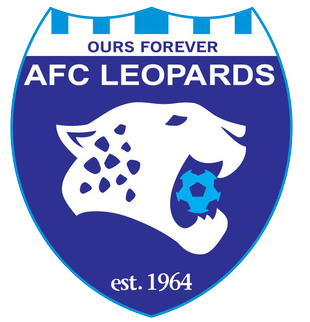 I am not sure if “Bunny” remembers this day but the image of him disappearing into the entrance is etched in my mind. I was left disappointed and excited at the same time, but not being one to wallow in disappointed I quickly prepared for the third option. So I put on my disappointed face walked to up to a man old enough to be my father queuing with his ticket in hand. I looked up to his face and with a desperate wink, “Daddy, please niingize…” (Dad, please take me in with you). Once he held my hand all my troubles were gone and there was my dream – AFC Leopards SC. I cannot remember who they were playing on this particular day but the usual atmosphere surrounding their matches was enough, not to mention the squad members then: “Ottomax”, Francis Oduor, Paul Ochieng’, Philip Ouma, Omar Banza, Hassan Sessay, Kayimba just to mention a few. For the better part of my formative footballing years these players represented my dream.
I am not sure if “Bunny” remembers this day but the image of him disappearing into the entrance is etched in my mind. I was left disappointed and excited at the same time, but not being one to wallow in disappointed I quickly prepared for the third option. So I put on my disappointed face walked to up to a man old enough to be my father queuing with his ticket in hand. I looked up to his face and with a desperate wink, “Daddy, please niingize…” (Dad, please take me in with you). Once he held my hand all my troubles were gone and there was my dream – AFC Leopards SC. I cannot remember who they were playing on this particular day but the usual atmosphere surrounding their matches was enough, not to mention the squad members then: “Ottomax”, Francis Oduor, Paul Ochieng’, Philip Ouma, Omar Banza, Hassan Sessay, Kayimba just to mention a few. For the better part of my formative footballing years these players represented my dream.
So often I would find myself alone pushing or evading imaginary opponents, kicking into thin air or at some unlucky object and scoring imaginary goals while donning the famous blue and white jersey, rio tinto. Then I would run to the imaginary opposing fans, very often Gor Mahia fans and right there I would do the Isikuti dance with the Isukuti drums ringing loud in my head. As they say, “the probability of someone watching you is directly proportional to the stupidity of your actions”. Well to date not one person has walked in on me while in my imaginary world. And yes, I still score and dance within the confines of my 4 walls so my dream might still be valid. Not. The closest I ever came to my living my dream was an offer from Gor Mahia fans to join their beloved team after my high school education. Then, my name betrayed me. It is rumoured that in those days the fans had the power to hire and fire.
Playing for AFC Leopards (or Gor Mahia) was and still is the dream of many Kenyan players. The 2 clubs command the largest followings in the country, but while Gor Mahia seems to have found its feet recently, my beloved AFC is staggering into oblivion. Recently, they could not make the numbers to honour a Kenyan Premier League fixture because the players had staged a sit out due to lack of pay. And when they finally managed to put a team on the field – the opponents were kind enough to wait – they had to use a striker, one of their Ugandan imports, as a makeshift goalkeeper. Lo and behold the team managed a 0 -1 win over an emerging soccer giant Sofapaka, with a heroic performance from the goalkeeper which included a penalty save. But the story does not end there as the goalkeeper received notice to vacate his house due to rent arrears the very next day. He was the second player facing an eviction in the span of a month. I am sure many more players, current and former, have faced similar circumstances and it is not just at the den. However, efusi is special and what interests me most is the way they are attempting to solve the problems bedevilling the club.
Football politics
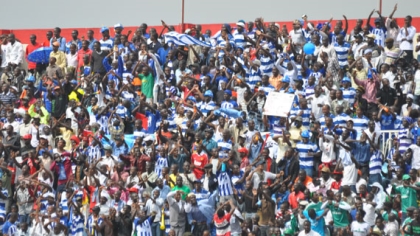 In my debut article, Football: More than just a game – A PEST Analysis, I talked about the politics surrounding the 2 clubs with the richest history in Kenya. Well, first in line to save the leopard has been the politician usually arriving just in time to salvage potentially embarrassing situations. True to their nature they disappear as soon as their names make the headlines, only to resurface when another ‘opportunity’ comes calling. As difficult as it may sound I think it is high time clubs such as AFC Leopards divorced themselves from politics and politicians, especially the handout kind. Support is always welcome and in this case needed, but it needs to be channeled through properly configured management structures. Caretaker committees mainly constituted of politicians (or aspiring politicians) have become pretty much the norm. Every time there is a crisis there is always a committee waiting to manage the team through a transition period. However the transitions never seem to end, mostly giving way to yet another poorly or rather politically elected transition management team. With such unstable leadership progress is hard to achieve.
In my debut article, Football: More than just a game – A PEST Analysis, I talked about the politics surrounding the 2 clubs with the richest history in Kenya. Well, first in line to save the leopard has been the politician usually arriving just in time to salvage potentially embarrassing situations. True to their nature they disappear as soon as their names make the headlines, only to resurface when another ‘opportunity’ comes calling. As difficult as it may sound I think it is high time clubs such as AFC Leopards divorced themselves from politics and politicians, especially the handout kind. Support is always welcome and in this case needed, but it needs to be channeled through properly configured management structures. Caretaker committees mainly constituted of politicians (or aspiring politicians) have become pretty much the norm. Every time there is a crisis there is always a committee waiting to manage the team through a transition period. However the transitions never seem to end, mostly giving way to yet another poorly or rather politically elected transition management team. With such unstable leadership progress is hard to achieve.
I think this is something Gor Mahia is beginning to exploit and the results are there for all to see. In the recent past we have seen less and less leadership wrangles and a lot of focus has gone into creating a sustainable outfit. There has been claims of embezzlement of finances, especially gate collections, but this seem to be drowned by the good performances currently being witnessed. Politics seems to have occupied its rightful place in the set up. Politics indeed has its role in football and that is to facilitate the business. The 1 shilling a loaf initiative is a good example, a model that can be copied and enhanced. I can only imagine the sales figures for bread in western Kenya if Abaluhya Football Club had such an initiative!
Crowdfunding
Second in line is the tried and tested mpesa. When I posted my previous article on the AFC Leopards Facebook page, I got a rather interesting comment to the effect of all efforts were now being channeled towards saving the Leopard and I was given the Paybill number 196464 (in case you want to contribute, feel free). In technological terms this type of action falls within the realms of crowdfunding, whereby large groups of people combine their economic power to support an organization, company or project. This is laudable but is it sustainable! According to one report by PwC, crowdfunding and its close cousin crowdsourcing represent a great opportunity for football clubs to engage stakeholders, mainly supporters. However, the report more importantly highlights the need for sound structures to facilitate the execution of such strategic business operations. AFC Leopards needs proper structures and strong leadership. Failure to address these issues renders any other initiatives futile. We cannot have every Wafula, Wekesa and Okoa running a faction of the club, claiming to be helping the club.
Furthermore, AFC Leopards and many other sports clubs need sportspreneurs, people who are able to see the potential of sports and create value for its stakeholders through a systematic process. That I believe is the way to save the leopard. The recent fundraiser realised KES 5.5 million against a target of KES 25 million. Perhaps an indication of stakeholder attitude towards the club. To be able to change this and reap from the devotion of the thousands of supporters requires a focused leadership devoid of excessive politics. Community ownership is a model that would work well for a club such as AFC. Instead of just making contributions why not put in place the structures that would allow fans to own a stake in the club and participate actively in its running? For example, most football clubs in Germany use a hybrid model with fans maintaining a controlling share in the business (club) while also allowing individual and corporate investors. That way the clubs are not overly dependent on unstable sponsorship deals and opportunist fundraisers.
That’s my contribution towards saving the Leopard.



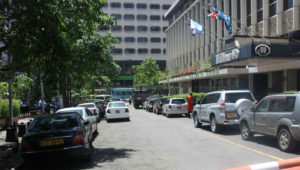
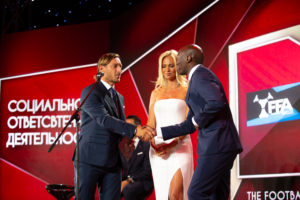
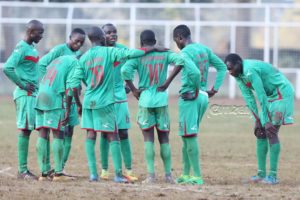
Wah those were the days brayo. Great memories no way i could ever forget ottomax carrying me through the gates..watching him and the team practiceplay BTW u remember option 4 .we became ball boys
Nothing to add on. Very brilliant ideas.
True to the point but one deadly thing eating into ingwe is”CLANISM” which is practiced both on and off the pitch; a bukusu has to play, the Tirikis played poorly, a Maragoli should be captain.
Another point is transparency. The a paybill number has been there but rarely do they account for the deposits thus there is less commitment by supporters in contributing.
I support your idea on the fans owning the club through shareholding and given a chance to access the books of account. Barcelona have survived without a sponsor yet they are as big as any other top dog.
Good point Evoh. Thanks. I think the issue of ‘clanism’ can also be managed by professionalising the operations of the club. The ‘clanism’ comes to the fore when people need an excuse for poor performance in other areas. Otherwise if the club was doing well both on and off then supporters will be much more willing to rally behind the playing unit and management their differences not withstanding.
Same applies to accountability. Right the club has put the cart in front of the horse. Raising funds without appropriate structure and systems in place will not work. Who do you hold accountable for the money, when office bearers change every other month.
Good read. The club has a big fan base and the idea would work if transparency is there.
Yes Ben. Transparency is key when trying to achieve meaningful and sustainable progress.
Amazing article…I wish our people had ears
Thanks Solomon. By voicing our views the message will get there one day.